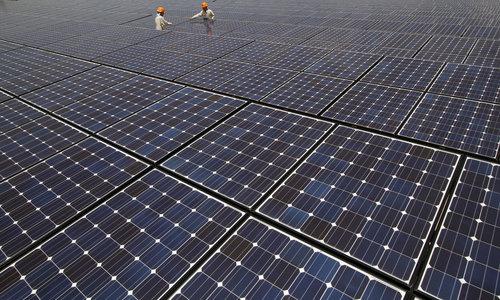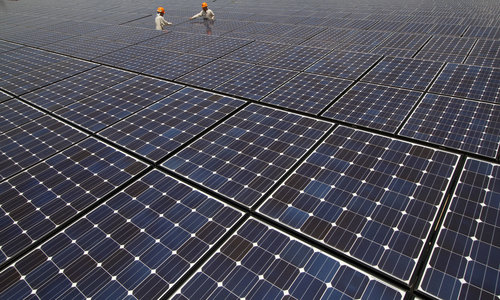
U.S. investment firms are readying the first line of exchange-traded funds designed to give American investors access to China's swelling onshore bond market, which has been largely closed off to foreigners.
At least four fund managers - Deutsche Bank AG, Global X Funds, KraneShares and Van Eck Global - have outlined plans to launch China onshore bond ETFs, according to company filings with the U.S. Securities and Exchange Commission. The first of the funds could launch as early as this month, sources familiar with the matter say.
Some of the funds will invest in a range of yuan assets, including government and corporate bonds, while others will be more specialised, focusing on commercial paper, for example. They will be targeted at both institutional and retail investors.
Gaining access is no small thing for investors. The government-related bond market is about $3 trillion (18.4 trillion yuan) and China's domestic corporate bond market has grown to about $1.5 trillion (9 trillion yuan) at the end of August, after companies raised a combined $261 billion (1.6 trillion yuan) from bond issuance in the first eight months of the year. In June, credit agency Standard & Poor's said the Chinese corporate bond market overtook the United States as the world's biggest, and is now set to soak up a third of global company debt needs over the next five years.
While onshore Chinese bonds carry the currency, default and regulatory risks that might be expected in a fledgling market, their relatively high yields and low correlation to U.S. Treasuries and other global fixed-income and equities markets will make them appealing to investors, analysts say.
"Yield levels are attractive," says Cecilia Chan, chief investment officer of fixed income for the Asia- Pacific region at HSBC Global Asset Management. She expects U.S. and European investors to look at China for yields they can't get in their own regions.
Ten-year yields on Chinese government bonds are hovering around 4 percent, compared to about 2.3 percent in the United States and Britain. If, as some investors expect, the Chinese economy slows further, then the value of high-yielding bonds will likely be bolstered as interest rates fall.
"The ability to be able to access that market, either by retail or institutional investors, is very appealing," says Bruno del Ama, chief executive officer of New York-based Global X Funds, because the burgeoning market has historically been out of reach for foreigners, even big investors. As the market expands and China relaxes its tight control over onshore assets, more investors may want to take part, he says.
Back to topLimitations, risk
Nevertheless, headwinds still exist.
For starters, there's the government-run quota system which limits foreign access to China's onshore market. Only about $108 billion (662.2 billion yuan) had been approved for foreign investment in the mainland's securities markets, including stocks and bonds, under the country's Renminbi Qualified Foreign Institutional Investor (RQFII) and Qualified Foreign Institutional Investor (QFII) programmes by the end of September.
To access those onshore bonds, U.S. fund issuers will have to partner with approved asset managers, mainly based in Hong Kong, and could find their supplies limited.
The operational complexity of these ETFs is, in part, reflected in the higher fees they are expected to demand. The KraneShares fund, for example, will charge 0.68 percent in annual management fees, while the Global X fund is expected to cost 0.65 percent in annual management fees.
In comparison, the PowerShares Chinese Yuan Dim Sum Bond fund, which invests in offshore bonds, has an annual management fee of 0.45 percent.
"Accessibility is definitely on the top of the list" of challenges, says Dennis Hudachek, a senior analyst with research firm ETF.com who is predicting strong investor demand for the comparatively high-yielding bonds. He points out that several onshore equity exchange-traded funds have already run up against their allocated quota this year.
While the lack of defaults in the Chinese corporate debt market is comforting for investors, it can add to uncertainty because of the possibility of shocks when the authorities do eventually allow more defaults. Bondholder protections have yet to be fully tested.
"It's quite like a belief, like a religion; how much bonds are protected by the government," says HSBC's Chan, referring to both government and corporate domestic bonds.
Chan says investors would like to see more defaults in minor issues "to watch how the default process is handled and look for the market to reprice the probability of default, especially for the low-credit quality bonds."
In March, solar equipment producer Chaori produced the first onshore default when it missed an interest payment, and analysts had expected the precedent-setting default might force a repricing of credit risk in a market that long assumed even high-yielding debt carried an implicit state guarantee.
Moody's, at the time, noted that regulators' higher tolerance for corporate bond defaults would be in line with the Chinese government's "shift to adopt more market-oriented policies."
But earlier this month, Chaori announced that nine domestic companies would step in to restructure the debt, along with a guarantee from state-owned China Great Wall Asset Management and a Shanghai-based investment firm to help repay bondholders.
Finally, there is currency risk as well. Only one of the KraneShares funds has explicitly said it will hedge currency, while the other funds in their filings do not indicate currency hedging and warn of the currency risks. The firms declined to comment on the specifics of the filings, as is typical before a fund's launch. While the yuan has been appreciating for years against the dollar gaining 2.9 percent in 2013, it has shed 1.5 percent so far in 2014.
Back to topBetter than dim sum
China's onshore market is a better reflection of the Chinese economy than so called "dim sum bonds" that are issued offshore, says del Ama. That offshore market can include debt issued by international companies such as fast food chain McDonald's Corp or heavy equipment maker Caterpillar Inc, so long as it is denominated in renminbi.
A couple of ETFs offer access to the dim sum market, but none to date access the onshore market.
The Global X filing indicates its fund will invest in a broad range of onshore bonds, including government and corporates, which are yielding in a range of 5 percent to 6 percent, depending on maturity and ratings. The Deutsche and Market Vectors filings indicate a similar broad composition.
KraneShares, a New York-based boutique asset manager focused on investing in China, is planning funds that will focus specifically on onshore commercial paper, which KraneShares Managing Director Brendan Ahern says offers yields of around 4.7 percent and access to utility companies, among the main issuers of commercial paper in China.
----------------------------------------------------------------------------------------------------------------------------------
Back to topChaori bailout shows Beijing's desire to protect bond market
By Charlie Zhu and Umesh Desai

The bailout of domestic bondholders of Chinese solar equipment producer Chaori shows the government is determined to shield its rapidly growing corporate bond market in a slowing economy, analysts and traders say.
Shanghai Chaori Solar Energy Science and Technology Co Ltd, which missed an interest payment on its bond in March, has announced that nine domestic companies, including Jiangsu Golden Concord, will form a joint venture to invest in the company in a debt restructuring.
State-owned China Great Wall Asset Management and a Shanghai-based investment firm will also guarantee 880 million yuan of the 1 billion yuan worth of bonds issued by Chaori in 2012 and traded on the Chinese securities market, the company said.
"I am surprised by the proposal. It is very generous and may give the impression that the government is bailing out the company," says Christopher Lee, Standard & Poor's rating analyst in Hong Kong.
Analysts had expected the precedent-setting default by Chaori in March to force a repricing of credit risk in a market that long assumed even high-yielding debt carried an implicit state guarantee.
That had caused the yield differentials between AAA- and AA-rated onshore Chinese corporate bonds to jump to as much as 120 basis points. Since then, the gap has narrowed to around 90 bps.
Some traders say the Chaori bailout was intended to offer assurance to investors, who are worried about the risks of bond defaults as companies in sectors ranging from property to steel struggle in the slowing economy.
"The government is literally telling people that at least there will not be any credit risks in the secondary bond market," says a credit trader with an Asian bank in Shanghai, who declined to be named as he is not authorised to speak to the media.
"This is good for investors, but bad for credit pricing. Investors will be less concerned about the fundamentals of issuers," he says.
China's domestic bond market was worth more than 9 trillion yuan at the end of August. In June, credit agency S&P said the Chinese corporate bond market overtook the United States as the world's biggest, and is now set to soak up a third of global company debt needs over the next five years.
In the first eight months of this year, Chinese companies raised a combined 1.6 trillion yuan from bond issuance, official data shows.
Defaults on offshore bonds issued by Chinese firms have occurred in the past. LDK Solar Co Ltd missed several interest payments on offshore U.S. dollar bonds last year, while Suntech Power Holdings Co Ltd defaulted on a $541 million dollar convertible bond last year.
China's solar industry has, in recent years, suffered from severe overcapacity and falling prices for photovoltaic cells, while the government has been embroiled in a trade war with the United States and the European Union.
Back to top




